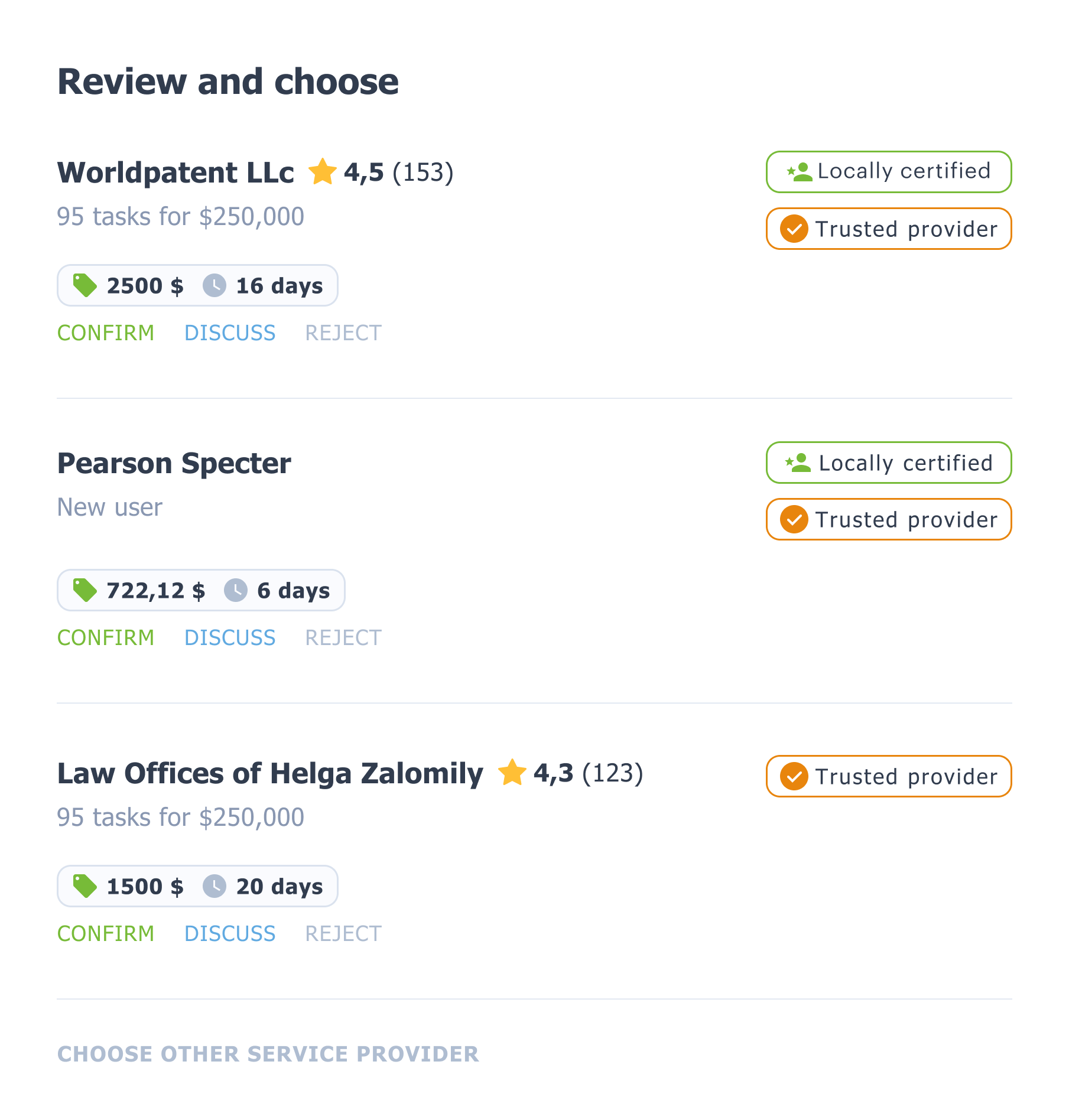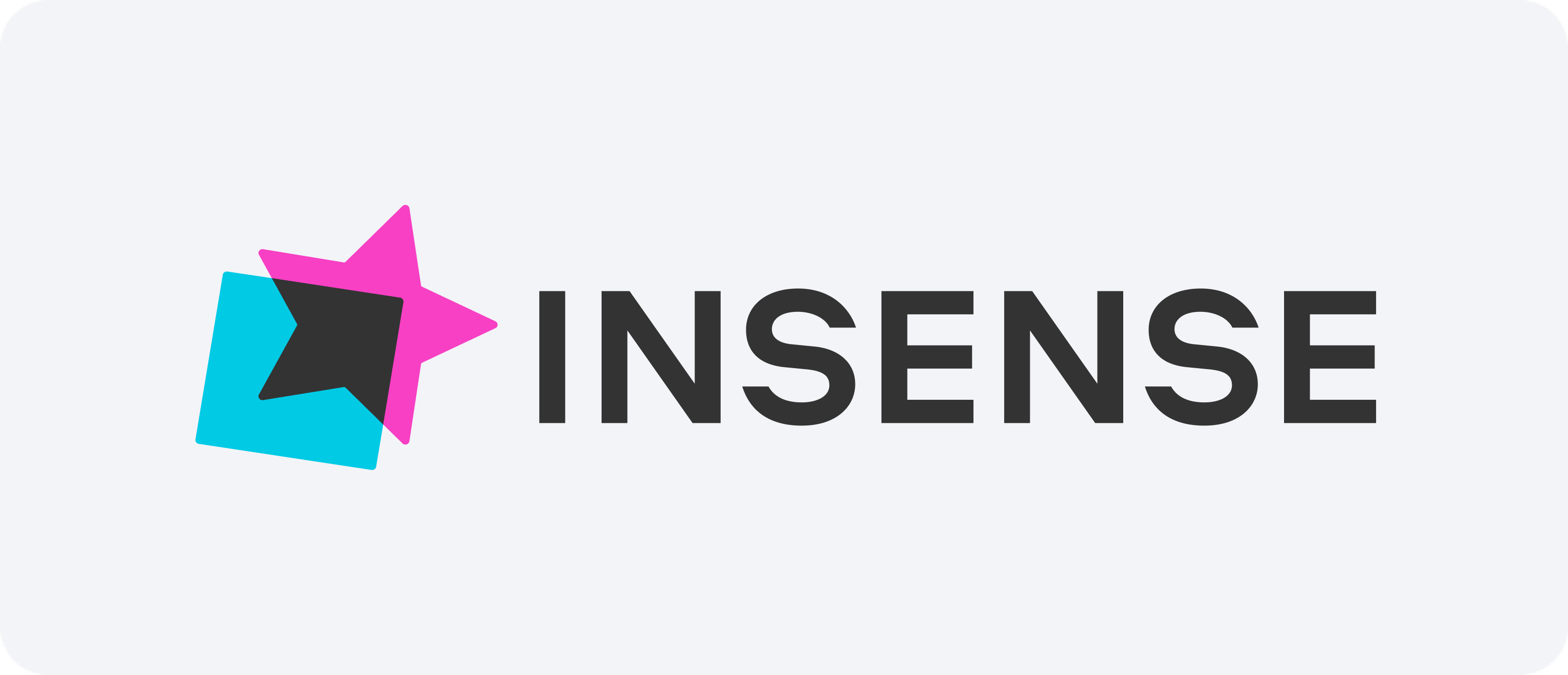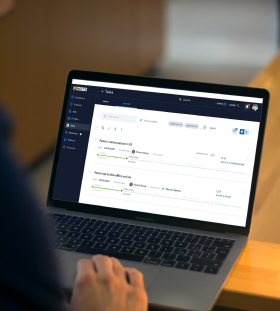Patent Office Action Responding in Malaysia
During the examination, you can receive an Office Action that may include requirements or objections. It is not a problem. The attorney will analyze this, devise a strategy, and prepare a response



During the examination, you can receive an Office Action that may include requirements or objections. It is not a problem. The attorney will analyze this, devise a strategy, and prepare a response







-
An AI-powered IP assistant that helps you create a detailed assignment within minutes.
-
Selection of the most suitable local patent attorney based on specific criteria.
-
Office action analysis, response strategy development, preparation, and filing done by an attorney.
-
Online monitoring and reporting on the platform throughout the entire process.

-

More than 800 IP law firms from 150+ countries, ranking and reviews
-

An AI-powered IP assistant that helps create tasks and find relevant attorneys
-

Flat fees, secure and fast online payments with guaranteed results
-

24/7 access to the registration process and online data storage for all your cases









































Patent Office Action Responding in Malaysia: Key Considerations and Best Practices
When applying for a patent, one of the most important procedural stages applicants face is receiving and addressing a patent office action. This official communication from the Intellectual Property Corporation of Malaysia (MyIPO) outlines objections, clarifications, or formal issues regarding an invention filing. An effective response to such an office action is critical for ensuring that the application proceeds smoothly toward grant. This article explores the nature of these communications, common issues raised, and strategies for crafting a successful response.
Understanding the Patent Office Action Process
An official examination report typically arises during the substantive review stage. After an applicant files a request for examination, MyIPO assigns the application to a technical examiner. The examiner conducts a thorough assessment of the application’s compliance with local legal and technical requirements. Based on this review, the examiner may issue a notification, raising concerns such as:
- Lack of novelty
- Inventive step issues
- Insufficient disclosure
- Formal defects (e.g., abstract formatting, claims language)
These examination reports are formal documents and must be taken seriously. Failure to submit feedback within the specified time limit—usually two months from the date of issuance—may lead to abandonment of the application.
Common Grounds for Office Action
Applicants should be aware of the typical reasons that may trigger an examiner’s report:
1. Lack of clarity or precision in claims
Claims that are too broad or vague often prompt examiners to request amendments.
2. Prior art issues
The examiner may cite earlier inventions or publications as prior art, challenging the novelty or inventive step of the invention.
3. Deficiencies in description
The documentation may lack sufficient detail or fail to support the claims adequately.
4. Formal errors
These include issues with diagrams, abstracts, or formatting, which can be corrected relatively easily.
5. Non-patentable subject matter
In Malaysia, certain categories such as discoveries, mathematical methods, or therapeutic methods are excluded from protection under IP law.
Crafting an Effective Response
An effective answer to an examiner’s notification requires a combination of legal insight, technical understanding, and strategic drafting. Applicants or their representatives should follow a structured approach to ensure the best chance of success:
Recommended Response Strategy:
- Careful analysis of the official correspondence
Examine each objection or requirement in detail to understand its legal and technical basis. - Review cited prior art
Identify distinguishing features of your invention not disclosed in the earlier references to argue for novelty or inventive steps. - Amend claims if necessary
Modify claims to clarify language, limit scope, or address novelty concerns while maintaining adequate protection. - Enhance the specification
Supplement or clarify the technical narrative to strengthen support for the claims. - Provide reasoned arguments
Where applicable, provide a technical and legal explanation as to why the concerns raised do not apply or are misplaced. - Submit your reply within the deadline
Timely submission is critical to avoid forfeiture of rights.
Timeline and Extensions in Malaysia
The time frame for replying to a notification from the examiner is generally two months. However, applicants can request an extension of time, usually for an additional two months. The request must be made before the expiry of the original deadline and must be supported by valid reasons.
Professional Support in Responding to Office Actions
Navigating an examiner’s objections can be complex, especially when dealing with intricate technical issues or legal interpretations. It is highly recommended that applicants engage a registered IP agent or legal expert familiar with Malaysian intellectual property law. These professionals can ensure the reply is thorough, compliant, and strategically sound.
Key Points to Remember: Checklist
Below is a checklist summarizing the essential steps and considerations when addressing an official communication from MyIPO:
- Identify all issues raised in the official notice
- Prioritize objections related to protection eligibility
- Review and distinguish prior art references
- Amend claims carefully, if needed
- Enhance the technical content to support revised claims
- Prepare and submit a well-reasoned justification
- Monitor deadlines and file for an extension if necessary
- Seek expert advice to strengthen your position
Conclusion
Responding to a patent office action in Malaysia is a vital stage that requires diligence, precision, and expertise. The outcome of this process can determine whether an application moves forward or is rejected. By understanding the examiner’s concerns, crafting a focused reply, and leveraging professional support, applicants can significantly improve their chances of securing valuable exclusive rights in the Malaysian jurisdiction.




